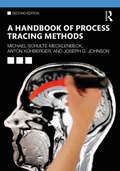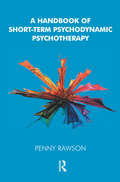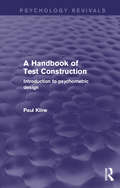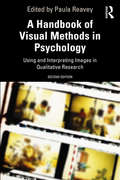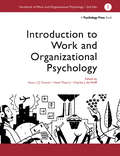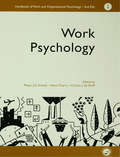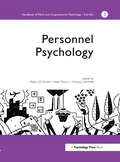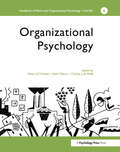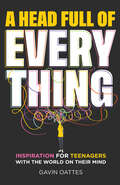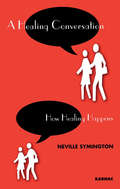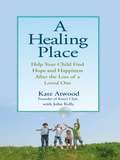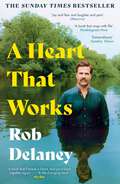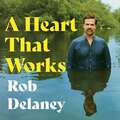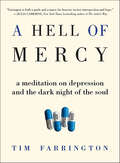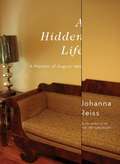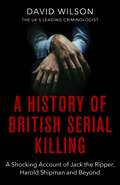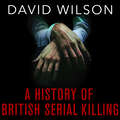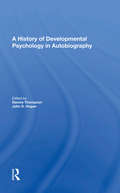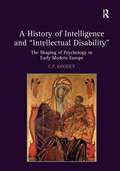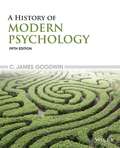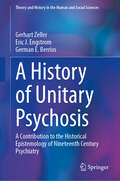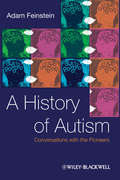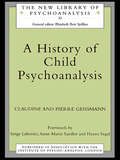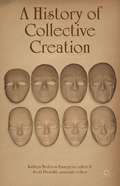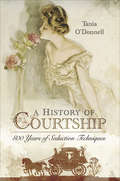- Table View
- List View
A Handbook of Process Tracing Methods: 2nd Edition (The Society for Judgment and Decision Making Series)
by Michael Schulte-Mecklenbeck Anton Kuehberger Joseph G. JohnsonA Handbook of Process Tracing Methods demonstrates how to better understand decision outcomes by studying decision processes, through the introduction of a number of exciting techniques. Decades of research have identified numerous idiosyncrasies in human decision behavior, but some of the most recent advances in the scientific study of decision making involve the development of sophisticated methods for understanding decision process—known as process tracing. In this volume, leading experts discuss the application of these methods and focus on the best practices for using some of the more popular techniques, discussing how to incorporate them into formal decision models. This edition has been expanded and thoroughly updated throughout, and now includes new chapters on mouse tracking, protocol analysis, neurocognitive methods, the measurement of valuation, as well as an overview of important software packages. The volume not only surveys cutting-edge research to illustrate the great variety in process tracing techniques, but also serves as a tutorial for how the novice researcher might implement these methods. A Handbook of Process Tracing Methods will be an essential read for all students and researchers of decision making.
A Handbook of Short-Term Psychodynamic Psychotherapy
by Penny RawsonShort-term psychotherapy has become more and more popular in recent years and there is an increasing need for therapists to be able to offer help without entering into many years of therapy. This practical volume is an introductory text and a quick reference guide to short-term therapy, by an experienced therapist and teacher of psychodynamic short-term therapy. It is based on lectures given on the topic to experienced therapists wanting to familiarise themselves with short-term therapy. In a clear and concise manner, the author explores the basics of this approach and moves on to discuss such topics as the importance of the first session; the timescale of the therapy, the different techniques; and ending of analysis. Full of useful tables and bullet points, this volume is an indispensable guide to short-term psychodynamic therapy for experienced therapists as well as laypeople who are interested in learning more about this method of therapy.
A Handbook of Test Construction: Introduction to Psychometric Design (Psychology Revivals)
by Paul KlinePsychological tests provide reliable and objective standards by which individuals can be evaluated in education and employment. Therefore accurate judgements must depend on the reliability and quality of the tests themselves. Originally published in 1986, this handbook by an internationally acknowledged expert provided an introductory and comprehensive treatment of the business of constructing good tests. Paul Kline shows how to construct a test and then to check that it is working well. Covering most kinds of tests, including computer presented tests of the time, Rasch scaling and tailored testing, this title offers: a clear introduction to this complex field; a glossary of specialist terms; an explanation of the objective of reliability; step-by-step guidance through the statistical procedures; a description of the techniques used in constructing and standardizing tests; guidelines with examples for writing the test items; computer programs for many of the techniques. Although the computer testing will inevitably have moved on, students on courses in occupational, educational and clinical psychology, as well as in psychological testing itself, would still find this a valuable source of information, guidance and clear explanation.
A Handbook of Visual Methods in Psychology: Using and Interpreting Images in Qualitative Research
by Paula ReaveyThis comprehensive volume explores the set of theoretical, methodological, ethical and analytical issues that shape the ways in which visual qualitative research is conducted in psychology. Using visual data such as film making, social media analyses, photography and model making, the book uniquely uses visual qualitative methods to broaden our understanding of experience and subjectivity. In recent years, visual research has seen a growing emphasis on the importance of culture in experience-based qualitative methods. Featuring contributors from diverse research backgrounds including narrative psychology, personal construct theory and psychoanalysis, the book examines the potential for visual methods in psychology. In each chapter of the book, the contributors explore and address how a visual approach has contributed to existing social and psychological theory in their line of research. The book provides up-to-date insights into combining methods to create new multi-modal methodologies, and analyses these with psychology-specific questions in mind. It covers topics such as sexuality, identity, group processes, child development, forensic psychology, race and gender, and would be the ideal companion for those studying or undertaking research in disciplines like psychology, sociology and gender studies.
A Handbook of Work and Organizational Psychology: Volume 1: Introduction to Work and Organizational Psychology (Handbook Of Work And Organizational Psychology Ser. #Vol. 3)
by Henk Thierry Pieter J.D. Drenth Charles J. de WolffThe introductory volume of the Handbook of Work and Organizational Psychology is concerned with definitional, historical and methodological fundamentals. It explores the nature of studies in work and organizational psychology; the role played by the professional psychologist; and the ways in which the discipline has developed within Europe. The editors attempt to characterize the domain of work and organizational psychology, and examine relations between this and other subdisciplines within psychology, as well as those disciplines outside psychology also concerned with work and organization.
A Handbook of Work and Organizational Psychology: Volume 2: Work Psychology (Handbook Of Work And Organizational Psychology Ser. #Vol. 3)
by Henk Thierry Pieter J.D. Drenth Charles J. de WolffWork Psychology, the second volume of the Handbook of Work and Organizational Psychology, concentrates on issues related to the direct relationship between the worker and the organization and on his or her task or function. This could be termed the classical tradition of work psychology, including human factors, psychology and ergonomics. This volume provides a comprehensive update on new issues and studies in this core area. Subjects like safety, occupational stress, workload and absenteeism due to sickness are tackled. Chapters discuss particular types of workers on whom psychologists have focused attention more recently: the older worker, the unemployed, and the foreign worker. Moving away somewhat from the 'micro-world' of the individual worker, models of human economic behaviour and the development of social indicator systems are also explored.
A Handbook of Work and Organizational Psychology: Volume 3: Personnel Psychology (Handbook Of Work And Organizational Psychology Ser. #Vol. 3)
by Henk Thierry Pieter J.D. Drenth Charles J. de WolffPersonnel Psychology (or Human Resource Management) examines individual differences and their consequences for the organization. Attention is paid to choice processes, abilities and capabilities, needs and need fulfilment, commitment, selection methods, career development, appraisal and training. The focus of personnel psychology is the satisfactory relationship between the employee and the organization, and takes in all the elements influencing this relationship ranging from the traditional area of personnel selection to recent considerations, such as conflict between client demands and government regulations, restriction of output, job evaluation practices, and industrial unrest.
A Handbook of Work and Organizational Psychology: Volume 4: Organizational Psychology (Handbook Of Work And Organizational Psychology Ser. #Vol. 3)
by Henk Thierry Pieter J.D. Drenth Charles J. de WolffOrganizational processes and the organization-environment interaction are discussed in this volume of the Handbook of Work and Organizational Psychology. Both organizational and environmental characteristics affect the behaviour of individuals and groups, but such characteristics are in turn also influenced by behavioural features. This volume on organizational psychology covers subject areas such as organization theory, organizational culture and change, leadership, decision making and participation, motivation and satisfaction, payment systems, effective communication, and social-organizational aspects of automation. The final chapter describes the impact upon behaviour and attitudes of the transition of a socialist-led society to a market economy.
A Head Full of Everything: Inspiration for Teenagers With the World on Their Mind
by Gavin OattesWelcome to life. Teenage life. The most awkward 7 years you’ll ever have; 84 months of change, 364 weeks of weird and 2,555 days of scrolling and inconvenience. In the grand scheme of life, it’s not a lot. Unless you’re an actual teenager, in which case, it’s EVERYTHING! “It’s the best years of your life!” they tell us. And yet, while it should be, for so many it just doesn’t feel like it. For most it’s an emotional assault course of acceptance, stress, anxiety, heartbreak and peer pressure, all whilst navigating the ‘hashtagony’ of social media. Misunderstood by society and misrepresented by the media, teenagers have it tough. A Head Full of Everything demonstrates that being a teenager doesn’t have to suck. And when it does, there’s some cool things you can do to make it suck a little less. This book will challenge you to embrace your inner weird, to never grow up, be true to yourself, protect your mental health and be sure that for your 7 glorious teenage years, you act your age. Literally. Bestselling author, award-winning comedian and international keynote speaker, Gavin Oattes has written a personal development title for teens with a difference – there’s no waffle, no dad chat, no fluff. Full of hilarious, real-life inspiration and a few crazy ideas along the way, A Head Full of Everything will leave you feeling motivated, energised and reassured that nobody has life all figured out.
A Healing Conversation: How Healing Happens
by Neville SymingtonHow is it that someone can be healed of mental illness through talking with another person? This is what Neville Symington examines in this book. He believes that a person in their innermost being registers the essential character of the other person. The senses detect the outer contours of the personality but a deeper form of knowledge connects directly to the other person's inner being. Healing comes about if the inner world of the one is guided by principles that transcend the particular and this fosters a giving-ness in the one and the other. The egoism in each is then subsumed into a higher unity which results in a new subjective understanding. Personal understanding is a sign that a new ordering of the inner ingredients of the personality has taken place; that the form of being in the one has the capacity to generate in the other this new way of being. The author explores this fundamental reality that underlies human communication and teases out how this brings about healing.
A Healing Place
by Kate AtwoodReal-world advice for caregivers of grieving children?from the founder of the nationally acclaimed, non-profit organization Kate?s Club. Kate?s Club is dedicated to empowering children and teens who have lost loved ones. Based on its founder?s down-to-earth philosophy on how to handle grief, A Healing Place aims to help parents cope with the realities and daily struggles grieving children face in a forthright, compassionate manner. The book is written from Kate?s own personal experiences after having lost, at the age of 12, her mother to breast cancer, as well as featuring experiences of the many families she has encountered through Kate?s Club. Chapter topics include: ? Embracing, not erasing memories ? Giving the child a voice ? How caregivers can be strong role models ? Handling transitions and traditions .
A Heart That Works
by Rob DelaneyIn this memoir of loss, acclaimed writer and comedian Rob Delaney grapples with the fragile miracle of life, the mysteries of death, and the question of purpose for those left behind.When you're a parent and your child gets hurt or sick, you not only try to help them get better but you also labour under the general belief that you can help them get better. That's not always the case though. Sometimes the nurses and the doctors can't fix what's wrong. Sometimes children die.Rob Delaney's beautiful, bright, gloriously alive son Henry died. He was one when he was diagnosed with a brain tumour. An experience beyond comprehension, but an experience Rob must share. Why does he feel compelled to talk about it, to write about it, to make people feel something like what he feels when he knows it will hurt them? Because, despite Henry's death, Rob still loves people. For that reason, he wants them to understand.A Heart That Works is an intimate, unflinching and fiercely funny exploration of loss - from the harrowing illness to the vivid, bodily impact of grief and the blind, furious rage that follows, through to the forceful, unstoppable love that remains. This is the story of what happens when you lose a child, and everything you discover about life in the process.
A Heart That Works: THE SUNDAY TIMES BESTSELLER
by Rob DelaneyThe comedian and star of Catastrophe's devastatingly moving memoir about his young son's death.In this devastating, beautiful and deeply moving memoir of the loss of his son, Rob Delaney explores what life really means, and why it matters. When you're a parent and your child gets hurt or sick, you not only try to help them get better but you also labour under the general belief that you can help them get better. That's not always the case though. Sometimes the nurses and the doctors can't fix what's wrong. Sometimes children die.Rob's beautiful, bright, deeply alive son Henry died. This is the story of what happens when you lose a child, and everything you discover about life in the process. Why does he feel compelled to talk about it, to write about it, to disseminate information designed to make people feel something like what he felt? What his wife feels? What his other sons feel? Done properly or well, it will hurt them. Why does he want to hurt people? Because, despite the death of his son, Rob still loves people. For that reason, he wants them to understand.(P)2022 Hodder & Stoughton Limited
A Hell of Mercy: A Meditation on Depression and the Dark Night of the Soul
by Tim Farringtonn this unflinching look at depression and the human struggle to find hope in its midst, acclaimed author Tim Farrington writes with heartrending honesty of his lifelong struggle with the condition he calls "a hell of mercy." With both wry humor and poignancy, he unravels the profound connection between depression and the spiritual path, the infamous dark night of the soul made popular by mystic John of the Cross. While depression can be a heartbreaking time of isolation and lethargy, it can also provide powerful spiritual insights and healing times of surrender. When doctors prescribe medication, patients are often left feeling as if part of their very selves has been numbed in order to become what some might call "normal." Farrington wrestles with profound questions, such as: When is depression a part of your identity, and when does it hold you back from realizing your potential? In the tradition of Darkness Visible and An Unquiet Mind, A Hell of Mercy is both a much needed companion for those walking this difficult terrain as well as a guide for anyone who has watched a loved one grapple with this inner emotional darkness.
A Hidden Life: A Memoir of August 1969
by Johanna ReissIn 1969, Reiss made the trip to Holland to chronicle the two years, seven months, and one day she had spent hiding from the Nazis. Subtle and disturbing, the book is a powerful consideration of memory, violence, and loss, told in a stunning and sparse narrative style.
A History Of British Serial Killing: The Shocking Account of Jack the Ripper, Harold Shipman and Beyond
by David WilsonBE THE FIRST TO READ DAVID WILSON'S NEW TRUE CRIME BOOK "A PLOT TO KILL" BY PRE-ORDERING NOW Expanded and updated, this is the definitive history of British serial killing 1888-2020 - by the UK's leading criminologist, David WilsonIn this fascinating and informative book, Professor David Wilson tells the stories of Britain's serial killers from Jack the Ripper to the extraordinary Suffolk Murders case. David Wilson has worked as a Prison Governor and as a profiler, and has been described as the UK's leading expert on serial killers. His work has led him to meet several of the UK's deadliest killers, and build up fascinating insights into what makes a serial killer - and who they are most likely to target. A vivid narrative history and a call for prison and social reform, Professor Wilson's new book is a powerful and gripping investigation of Britain's serial murderers.
A History Of British Serial Killing: The Shocking Account of Jack the Ripper, Harold Shipman and Beyond (The Books of Babel)
by David WilsonBE THE FIRST TO READ DAVID WILSON'S NEW TRUE CRIME BOOK "A PLOT TO KILL" BY PRE-ORDERING NOW Expanded and updated, this is the definitive history of British serial killing 1888-2020 - by the UK's leading criminologist, David WilsonIn this fascinating and informative book, Professor David Wilson tells the stories of Britain's serial killers from Jack the Ripper to the extraordinary Suffolk Murders case. David Wilson has worked as a Prison Governor and as a profiler, and has been described as the UK's leading expert on serial killers. His work has led him to meet several of the UK's deadliest killers, and build up fascinating insights into what makes a serial killer - and who they are most likely to target. A vivid narrative history and a call for prison and social reform, Professor Wilson's new book is a powerful and gripping investigation of Britain's serial murderers.
A History Of Developmental Psychology In Autobiography
by Dennis N ThompsonThe ten original essays presented here chart the personal and professional life experiences of these remarkable contributors from the discipline of developmental psychology. Employing the autobiographical approach, the book provides a unique view of how research and scientific inquiries are conducted while adding the human dimension generally absen
A History Of Intelligence And 'intellectual Disability': The Shaping Of Psychology In Early Modern Europe
by C. F. GoodeyStarting with the hypothesis that not only human intelligence but also its antithesis 'intellectual disability' are nothing more than historical contingencies, C.F. Goodey's paradigm-shifting study traces the rich interplay between labelled human types and the radically changing characteristics attributed to them. From the twelfth-century beginnings of European social administration to the onset of formal human science disciplines in the modern era, A History of Intelligence and 'Intellectual Disability' reconstructs the socio-political and religious contexts of intellectual ability and disability, and demonstrates how these concepts became part of psychology, medicine and biology. Goodey examines a wide array of classical, late medieval and Renaissance texts, from popular guides on conduct and behavior to medical treatises and from religious and philosophical works to poetry and drama. Focusing especially on the period between the Protestant Reformation and 1700, Goodey challenges the accepted wisdom that would have us believe that 'intelligence' and 'disability' describe natural, trans-historical realities. Instead, Goodey argues for a model that views intellectual disability and indeed the intellectually disabled person as recent cultural creations. His book is destined to become a standard resource for scholars interested in the history of psychology and medicine, the social origins of human self-representation, and current ethical debates about the genetics of intelligence.
A History Of Modern Psychology (Fifth Edition)
by C. James GoodwinThe enhanced 5th Edition of Goodwin's series, A History of Modern Psychology, explores the modern history of psychology including the fundamental bases of psychology and psychology's advancements in the 20th century.
A History of 'Unitary Psychosis': A Contribution to the Historical Epistemology of Nineteenth Century Psychiatry (Theory and History in the Human and Social Sciences)
by German E. Berrios Gerhart Zeller Eric J. EngstromGerhart Zeller&’s prize-winning 1961 study of the history of the concept of unitary psychosis has never before been published in German or English. To date, the manuscript remains by far the best historical account of the early development of the concept in Germany. The editors&’ introduction analyzes Zeller&’s monograph on three temporal levels. First, as a rediscovered original contribution to historical scholarship on nineteenth century psychiatric classification. Second, as an historical document in its own right, situated on the threshold between the murderous atrocities of the Holocaust and the psychiatric reforms of the 1970s and &’80s (Psychiatrie-Enquête). Third, as a unique contribution to post-Neo-Kraepelinian discourse and to the critiques of contemporary psychiatric nosologies (DSM) and research agendas (RDoC). In helping to elucidate the historical evolution of dimensional approaches to psychiatric classification, the monograph is likely to resonate within wider current biomedical trends toward personalized medicine and molecular diagnostics, and to find a readership among psychiatric practitioners and historians alike.
A History of Autism
by Adam FeinsteinThis unique book is the first to fully explore the history of autism - from the first descriptions of autistic-type behaviour to the present day. Features in-depth discussions with leading professionals and pioneers to provide an unprecedented insight into the historical changes in the perception of autism and approaches to itPresents carefully chosen case studies and the latest findings in the fieldIncludes evidence from many previously unpublished documents and illustrationsInterviews with parents of autistic children acknowledge the important contribution they have made to a more profound understanding of this enigmatic condition
A History of Child Psychoanalysis (The New Library of Psychoanalysis #Vol. 30)
by the late Geissmann Claudine GeissmannChild analysis has occupied a special place in the history of psychoanalysis because of the challenges it poses to practitioners and the clashes it has provoked among its advocates. Since the early days in Vienna under Sigmund Freud child psychoanalysts have tried to comprehend and make comprehensible to others the psychosomatic troubles of childhood and to adapt clinical and therapeutic approaches to all the stages of development of the baby, the child, the adolescent and the young adult. Claudine and Pierre Geissmann trace the history and development of child analysis over the last century and assess the contributions made by pioneers of the discipline, whose efforts to expand its theoretical foundations led to conflict between schools of thought, most notably to the rift between Anna Freud and Melanie Klein. Now taught and practised widely in Europe, the USA and South America, child and adolescent psychoanalysis is unique in the insight it gives into the psychological aspects of child development, and in the therapeutic benefits it can bring both to the child and its family.
A History of Collective Creation
by Kathryn Mederos Syssoyeva Scott ProudfitCollective creation - the practice of collaboratively devising works of performance - rose to prominence not simply as a performance making method, but as an institutional model. By examining theatre practices in Europe and North America, this book explores collective creation's roots in the theatrical experiments of the early twentieth century.
A History of Courtship: 800 Years of Seduction Techniques
by Tania O'DonnellExplore 800 years of lust, love, and loss.The author takes the reader on a journey from medieval courtly love, through to the sexual license of the Restoration, and Victorian propriety. Pick up historical 'dating tips', from how to court (or be courted); write romantic love letters, give and receive gifts, propose and pose as a sighing swain. A historical approach to the problem of finding a mate, with case studies of classic romantic mistakes and plenty of unusual tales. In the fourteenth century young men tried to impress the ladies with their footwear, donning shoes with pointed toes so long that they had to be secured with whalebone presumably because size mattered!
